In this article:
Self-defense classes have become increasingly popular in recent years. With the rising concern about safety and security, more and more people are realizing the importance of learning how to defend themselves.
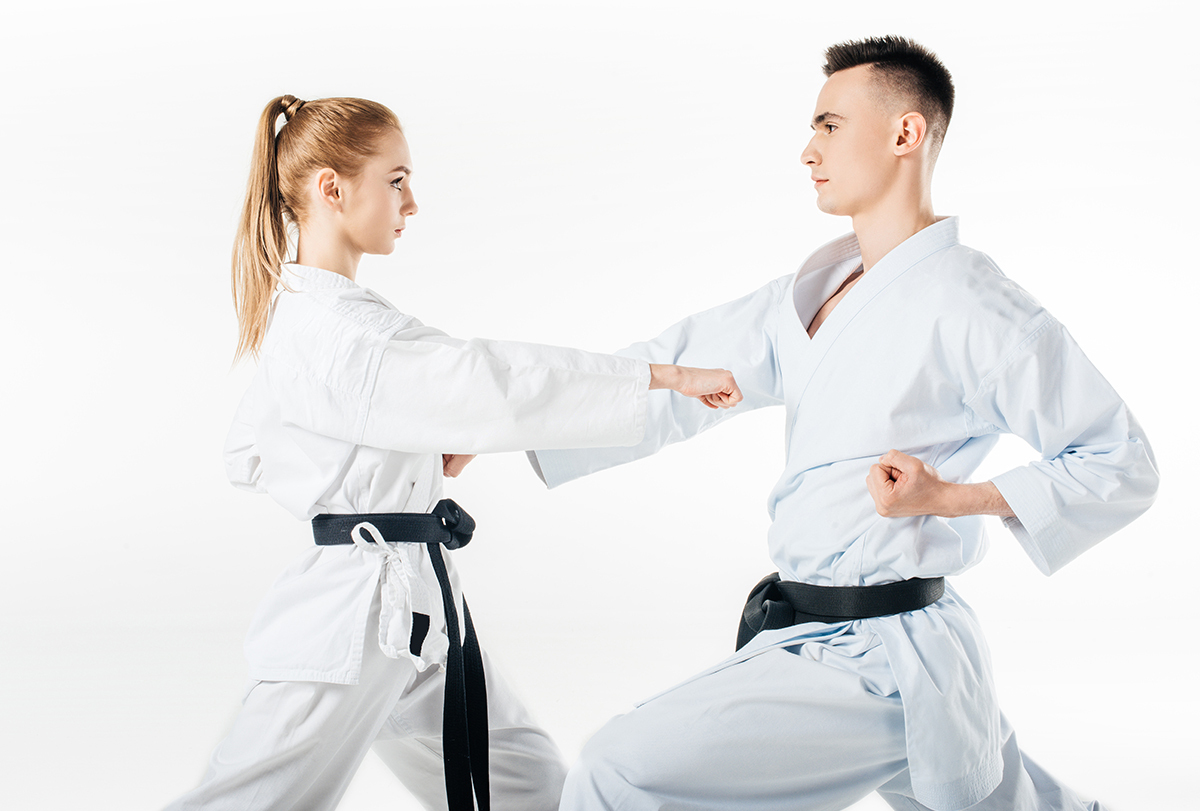
Self-defense refers to the use of physical force to defend oneself or others from an attacker or an imminent threat of attack. This concept also extends to a legally protected interest that could be under threat.
The use of self-defense as a measure is one of the few exceptions to the general prohibition against the use of force as outlined in Article 2 (4) of the United Nations Charter and customary international law. (1)
Self-defense classes not only teach you how to protect yourself in dangerous situations but also provide numerous other benefits for your physical and mental well-being.
This article will explore the reasons everyone should take self-defense classes and how they can benefit overall health.
Benefits of Learning Self-Defense
Learning how to defend yourself can offer the following advantages.
1. Boosts confidence
One of the primary benefits of self-defense classes is that you will learn important techniques to protect yourself in dangerous situations. These techniques can be invaluable if you ever find yourself in a threatening situation. Ultimately, these will make you feel safe about yourself and boost your confidence and self-esteem. (2)
Self-defense classes teach you how to recognize potential danger, avoid confrontations, and defend yourself against physical attacks. (3)
According to a study, women who took self-defense classes reported feeling more confident in their ability to defend themselves. (4)(5)
2. Improves physical fitness
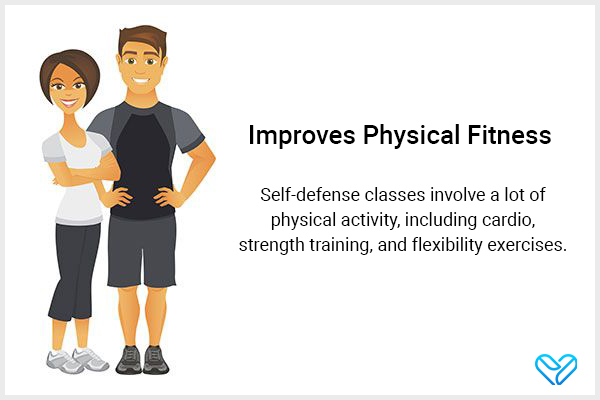
Self-defense classes involve a lot of physical activity, including cardio, strength training, and flexibility exercises. These classes can be a great way to stay active and improve your overall physical fitness.
You will also learn techniques that require full-body engagement, (6) which can help to tone and strengthen your muscles.
A study found that martial arts training (which is commonly seen in self-defense classes) can improve strength, balance, endurance, and flexibility. (7)(8)
3. Improves mental health
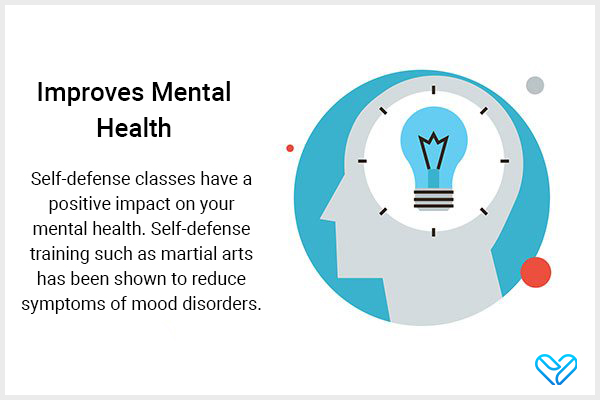
Self-defense classes can also have a positive impact on your mental health. Self-defense training such as martial arts has been shown to reduce symptoms of mood disorders.
A study found that practicing martial arts had a positive effect on well-being and could help reduce symptoms associated with internalizing mental health issues, such as depression and anxiety. (9)
Furthermore, self-defense classes can teach you how to manage your anger in a healthy way. The same study also showed that martial arts training had a small positive effect on reducing aggression. (9)
So if you’re looking for a fun and active way to boost your mental health, maybe consider signing up for a self-defense class!
4. Teaches self-discipline and self-control
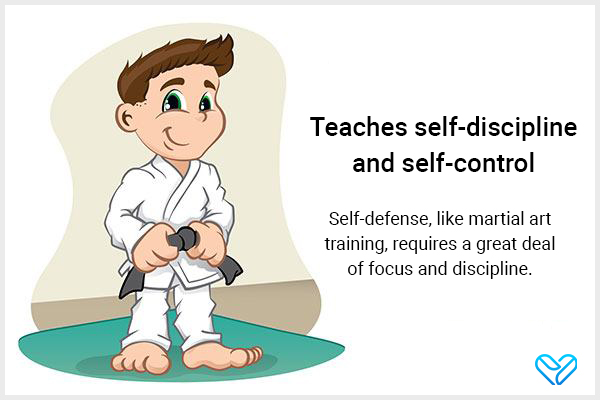
Self-defense, like martial art training, requires a great deal of focus and discipline. You will learn techniques that require precision and practice, and you will need to develop self-control to execute these techniques correctly. (8)
The discipline and self-control you learn in self-defense classes can be applied to other areas of your life as well.
5. Teaches setting personal boundaries
Did you know that good verbal skills can be an effective tool for self-defense? Self-defense classes can teach you how to set personal boundaries and communicate assertively. (2)
In these classes, you will learn how to recognize potentially dangerous situations and how to communicate your boundaries effectively. When an attacker engages you in a conversation, they’re actually trying to see if you’d make an easy target. (3)
Skilled attackers can use their words to intimidate you and make you feel helpless. However, if you show them that you’re not an easy target and respond confidently and assertively, you’ll likely deter them from attacking you.
So, next time you’re feeling uncomfortable or threatened, remember that your voice and your ability to assert your boundaries can be a powerful self-defense tool. (3)
6. Prevents accidents
When you learn martial arts and self-defense, you’re improving your ability to move your body in the right way at the right time. This helps you develop better reflexes and coordination, which can be helpful not just in fighting but also in everyday life.
This is because most self-defense techniques involve multiple movements at once. For instance, in taekwondo self-defense training, a type of exercise called one-step sparring involves 10 different movements. (10)
Being able to move quickly and confidently can help you avoid accidents and respond to unexpected situations.
So, if you’re looking to improve your reflexes and coordination, taking self-defense classes could be a fun and effective way to do it!
7. Helps deal with trauma
A traumatic event can have a lasting impact on mental and physical health. Participating in a self-defense class that is specifically designed for trauma survivors can be a helpful addition to traditional therapy.
This type of self-defense class is created with input from therapists and trauma experts, and it takes into account the connection between physical movement and psychological trauma.
Studies have shown that engaging in physical activity can help “unblock” responses to trauma and improve overall mental health. Self-defense classes are taught in a supportive environment and can be tailored to meet the unique needs of each participant. (11)
Self-defense training could be an adjunct intervention for the treatment of post-traumatic stress disorder in women veterans. (2)
8. Reduces the risk of sexual assault
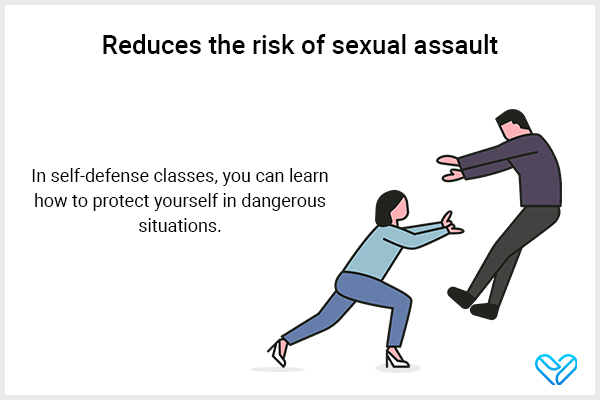
In self-defense classes, you can learn how to protect yourself in dangerous situations. These classes are often recommended for women to reduce their chances of being sexually assaulted.
A study found that women who took self-defense classes were less likely to experience sexual assault and felt more confident in their ability to defend themselves compared to women who did not take the classes. Thus, self-defense classes can be an effective strategy for reducing the risk of sexual assault. (12)
When Is Self-Defense Justified?
For self-defense to be justified, four things need to be present: (13)
- Someone attacks you without you provoking them.
- Their attack threatens to seriously hurt or kill you or someone else.
- You use a reasonable amount of force to stop their attack.
- Your fear of injury or death is reasonable.
Note: There are two exceptions to the first unprovoked attack rule. The first is when someone uses more force than necessary in response to an attack. The second is when the person being attacked tries to get away from the attack but is unable to do so. (13)
Battered wife defense
The battered wife defense is when a woman who is being abused by her spouse can use force to protect herself under certain circumstances, even if the threat of harm is not immediate. This defense is allowed because the woman faces an imminent threat every day due to the constant abuse.
Deadly force defense
Deadly force is appropriate in self-defense if the attacker is threatening to kill or seriously hurt you or someone else. In some places, deadly force may also be used if the attacker is committing a serious crime. It is important to note that deadly force should only be used as a last resort. (13)
Basic Self-Defense Techniques
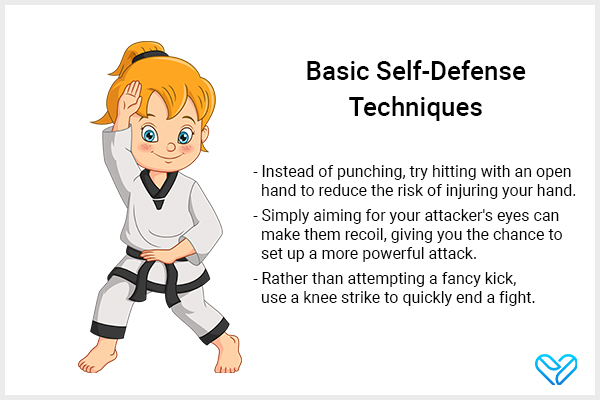
In self-defense situations, it’s important to focus on mastering and sticking to basic techniques, no matter which martial art you practice. Here are a few effective techniques to consider: (3)
- Instead of punching, try hitting with an open hand to reduce the risk of injuring your hand.
- Simply aiming for your attacker’s eyes can make them recoil, giving you the chance to set up a more powerful attack.
- Rather than attempting a fancy kick, use a knee strike to quickly end a fight.
Most-Asked Questions
Who can take self-defense classes?
Anyone can take self-defense classes, regardless of age, gender, or fitness level.
What should I wear to a self-defense class?
Wear comfortable clothing that allows you to move freely, such as workout clothes or sweatpants and a T-shirt.
Are self-defense classes expensive?
The cost of self-defense classes varies depending on the location and the type of class. Some community centers and schools offer affordable or free classes, while others may require a fee.
Do I need any prior experience to take self-defense classes?
No prior experience is necessary to take self-defense classes.
Final Word
Self-defense classes offer numerous benefits, including improved physical health, increased confidence, stress reduction, and improved situational awareness. They also teach important life skills that can be applied to other areas of life.
Regardless of age, gender, or fitness level, everyone can benefit from self-defense training. Whether you’re looking to boost your overall health, improve your confidence, or learn how to protect yourself in potentially dangerous situations, self-defense classes are an excellent way to achieve any of these goals.
- Was this article helpful?
- YES, THANKS!NOT REALLY


